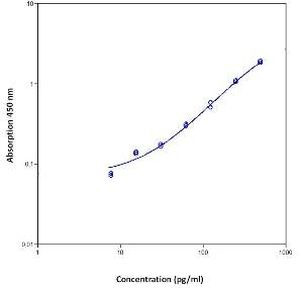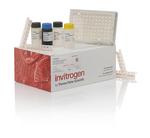Search Thermo Fisher Scientific
Product Specifications
Analytical sensitivity
Assay range
Sample type/volume
Hands-on time
Time-to-result
Homogenous (no wash)
Interassay CV
Intraassay CV
Instrument
Product size
Contents
Biotinylated Detection Antibody
SAV-HRP
Sample Diluent, lyophilized
Standard (8-well strips x 4)
Wash Buffer Concentrate
Substrate Solution
Sample Diluent
Stop Solution
Lysis Buffer 10x
Adhesive Plate Covers
Shipping conditions
Storage
Protein name
Species (tested)
Assay kit format
Detector antibody conjugate
Label or dye
About This Kit
The Human Tumor Necrosis Factor alpha (Hu TNFα) ELISA quantitates Hu TNFα in human serum, plasma, cell culture supernatants, amniotic fluid, synovial fluid, urine or other body fluids. The assay will exclusively recognize both natural and recombinant Hu TNFα.
Principle of the method
The Human TNFα solid-phase sandwich ELISA (enzyme-linked immunosorbent assay) is designed to measure the amount of the target bound between a matched antibody pair. A target-specific antibody has been pre-coated in the wells of the supplied microplate. Samples or controls are then added into these wells and bind to the immobilized (capture) antibody. The sandwich is formed by the binding of the second (detector) antibody to the target on a different epitope from the capture antibody. An antibody conjugated with enzyme binds the formed sandwich. After incubation and washing steps to rid the microplate of unbound substances, a substrate solution is added that reacts with the enzyme-antibody-target complex to produce measurable signal. The intensity of this signal is directly proportional to the concentration of target present in the original specimen.
Rigorous validation
Each manufactured lot of this ELISA kit is quality tested for criteria such as sensitivity, specificity, precision, and lot-to-lot consistency. See manual for more information on validation.
TNF alpha is a multifunctional proinflammatory cytokine that belongs to the tumor necrosis factor (TNF) superfamily. This cytokine is mainly secreted by macrophage and bind to its receptors, TNFRSF1A/TNFR1 and TNFRSF1B/TNFBR. TNF alpha is involved in the regulation of immune cells, cell proliferation, differentiation, apoptosis, lipid metabolism, and coagulation. TNF alpha exists as a multimer of two, three, or five noncovalently linked units, but shows a single 17 kDa band following SDS-PAGE under non-reducing conditions. Knockout studies in mice also suggested the neuroprotective function of TNF alpha, and has been observed to causes tumor necrosis when injected into tumor-bearing mice. Other functions of TNF-alpha include its role in the immune response to bacterial, viral, parasitic and certain fungal infections, as well as its role in the necrosis of specific tumors. TNF alpha causes cytolysis or cytostasis of certain transformed cells, being synergistic with interferon-gamma in its cytotoxicity. This cytokine has been implicated in a variety of diseases, including autoimmune diseases, insulin resistance, and cancer.
For Research Use Only. Not for use in diagnostic procedures. Not for resale without express authorization.
Bioinformatics
Gene aliases : DIF, TNF, TNF-alpha, TNFA, TNFSF2, TNLG1F
Gene ID : (Human) 7124
Gene symbol : TNF
Protein Aliases : APC1 protein, Cachectin, TNF, macrophage-derived, monocyte-derived, TNF-a, TNF-alpha, Tumor necrosis factor, tumor necrosis factor ligand 1F, Tumor necrosis factor ligand superfamily member 2, tumor necrosis factor-alpha
UniProt ID (Human) P01375

Performance Guarantee
If an Invitrogen™ antibody doesn't perform as described on our website or datasheet,we'll replace the product at no cost to you, or provide you with a credit for a future purchase.*
Learn more
We're here to help
Get expert recommendations for common problems or connect directly with an on staff expert for technical assistance related to applications, equipment and general product use.
Contact tech support


